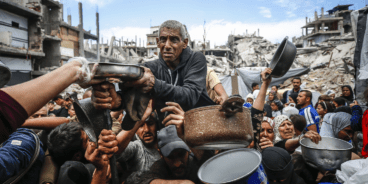Atrocity Alert No. 20: Iraq and Syria
Atrocity Alert is a weekly publication by the Global Centre for the Responsibility to Protect highlighting and updating situations where populations are at risk of, or are enduring, mass atrocity crimes.
Iraq
On 30 August The Associate Press (AP) published a report asserting that the so-called Islamic State of Iraq and the Levant (ISIL) has scattered more than 72 mass graves across locations in Iraq and Syria. According to the AP’s report, there are between 5,200 and 15,000 victims buried in mass graves in territories recovered from ISIL control. Many of the mass graves are located in the Sinjar region of Iraq, where ISIL launched an attack in August 2014 on the Yazidi population. The UN-mandated Commission of Inquiry on Syria has found that ISIL has committed genocide, crimes against humanity and war crimes against the Yazidis. According to the AP report, evidence of ISIL’s atrocities extend “well outside the Yazidi region in northern Iraq” with at least one mass grave holding hundreds of members of “a single tribe all but exterminated when IS extremists took over their region.” An inability to systematically investigate and recover evidence from these mass graves will inhibit efforts to hold perpetrators accountable for mass atrocity crimes.
Syria
On 24 August the Leadership Panel of the UN-Organization for the Prohibition of Chemical Weapons (OPCW) Joint Investigation Mechanism (JIM), mandated by the UN Security Council in 2015 to identify those responsible for the use of chemical weapons in Syria, issued a report with “sufficient evidence” of three cases of chemical weapons use. The report marks the first international investigation attributing responsibility for perpetrating chemical weapons use in Syria. The JIM attributed two cases of chlorine gas attacks during 2014 and 2015 to the Syrian Airforce and one sulfur-mustard attack during 2015 to ISIL. The use of chemical weapons constitutes a war crime and is in clear violation of international humanitarian law and the Chemical Weapons Convention, which Syria acceded to in 2013.
Following a sarin gas attack on the Ghouta area of Damascus in August 2013 that killed an estimated 1,400 people, the UN Security Council passed Resolution 2118 endorsing a plan by the OPCW for the expeditious destruction of Syria’s chemical weapons program and asserting that in the event of non-compliance it would impose measures under Chapter VII of the UN Charter. Following a Security Council meeting regarding the JIM report on 30 August, the Council has yet to take measures in response to the investigation.
Read Next

Atrocity Alert No. 445: Sudan, Syria and Eritrea

11th Meeting of the Global Network of R2P Focal Points Outcome Document
